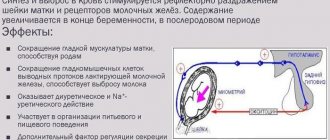Causes of a hard belly in healthy people
If a person is sure that he has no diseases, and a hard stomach appears without dangerous symptoms, the following conditions are possible:
- During eating, a lot of air is swallowed - due to drinking carbonated drinks or talking. Additionally, frequent belching and flatulence without an unpleasant odor appear.
- Similar symptoms appear when drinking soda for heartburn.
- Foods consisting of starch and indigestible fiber (beans, cabbage, bread, potatoes) can cause bloating.
- A hard belly occurs due to the abuse of baked goods, baked goods and sweet foods that increase gas formation.
These symptoms go away on their own and do not cause discomfort. However, more dangerous disorders may be hidden behind hard belly syndrome.
Flatulence in infants
Flatulence and a bloated belly are common in infants. Flatulence occurs in approximately 80% of children under one year of age. This is due to the fact that children’s intestines are growing rapidly, while the amount of enzymes produced is not yet at a level sufficient to digest food. This phenomenon can cause the child to experience pain.
To prevent bloating, the child must be periodically placed in an upright position to make it easier for gases to escape. Also, while breastfeeding, it is necessary to ensure that the child wraps his lips tightly around the nipple. The baby should be fed on demand, otherwise the baby will get hungry and suck too greedily, which will lead to a large amount of swallowed air and, ultimately, to bloating. To facilitate digestion, the child can be given enzyme preparations, herbal carminatives, for example, dill water.
Pathological causes
If a hard lower abdomen is detected, the following disorders may be suspected:
- improper functioning of the intestines, lack of enzymes - found in lactose intolerance, celiac disease;
- dysbacteriosis – develops when there is an insufficient amount of beneficial microflora, the cause may be prolonged use of medications or constant consumption of junk food;
- the formation of cysts, tumors and polyps - this process is often accompanied by additional symptoms;
- development of intestinal obstruction against the background of other disorders.
If hardness appears at a certain point, this may be a consequence of a strangulated hernia, which causes swelling and intense pain.
With a hard lower abdomen, women may experience tumor processes and inflammation in the ovaries and uterus. If the stomach inflates like a balloon and becomes hard throughout the entire area, we are talking about diseases of the heart, liver, and pancreas.
One of the most common causes of a hard belly is appendicitis, which can be identified by sharp pain. If you put your hand on your right side, press hard, and then immediately release, the pain will intensify if the appendage of the cecum becomes inflamed.
In women, a hard stomach develops against the background of some other disorders:
- severe stress and anxiety;
- early pregnancy;
- varicose veins of the pelvis;
- PMS.
In the latter stages of pregnancy, a hard lower abdomen indicates impending labor.
Additional signs and other diseases
If we take a closer look at the reasons for the appearance of a hard belly in men and women, we can identify a number of diseases:
- liver pathologies - hepatitis, cirrhosis - are accompanied by yellow skin, change in urine color, pain under the right rib, nausea and bitterness in the mouth;
- pancreatitis – the anterior abdominal wall becomes tense, girdle pain and severe nausea appear;
- heart failure - along with a tense abdomen, an enlarged spleen, shortness of breath, swelling and dullness of heart sounds are detected;
- tumor processes are often accompanied by changes in abdominal size, diarrhea or constipation, poor appetite and weight loss;
- with blood diseases, the lymph nodes and spleen enlarge, the skin turns pale, fatigue and unclear bleeding appear;
- with cholelithiasis, symptoms of bilirubin intoxication appear;
- if inflammation of the kidneys occurs, acute pain occurs in the lumbar area, there is no urine discharge, or it is released minimally and mixed with blood;
- In case of gynecological diseases, leucorrhoea mixed with blood and pus, characterized by an unpleasant odor, is always released from the genital organs.
If bloating occurs due to excessive accumulation of helminths, pain appears, frequent allergies in the form of rashes, and possible diarrhea or constipation.
Causes of feeling of a full stomach
The emergence of a feeling of early satiety, fullness, distension of the epigastric region, as a result of minor disorders of the digestive system:
- Lactose intolerance is when the digestive tract cannot digest lactose. The older a person is, the less enzymes are secreted that can digest lactose. Sugar does not break down and begins to ferment, releasing gases. These are the causes of bloating.
- Food allergy is a condition in which the human body does not accept certain foods. In this case, consultation with a nutritionist is mandatory.
- A state of rapid satiety and a feeling of a full stomach can occur in heavy smokers. The gastric mucosa is irritated by nicotine and ceases to fully perform its functions.
- A pregnant woman also complains of feeling similar symptoms. The acidity of gastric juice, as a rule, increases, hence nausea and a feeling of heaviness in the stomach, fullness in the abdomen.
- Functional indigestion, functional dyspepsia, or irritable bowel syndrome is a set of symptoms that includes pain and discomfort in the stomach. A person feels heaviness, pain, the stomach seems to be bursting, there is a feeling of fullness in the abdomen, vomiting, belching. Functional dyspepsia is typical for patients with impaired motility and hypersensitivity of gastric receptors to stretching. The reasons for this condition are stress and serious psychological experiences. Relieving the patient's mental state is the best treatment in this situation.
A feeling of fullness in the epigastric region may be a consequence of serious illnesses. Heaviness in the stomach, combined with bloating and increased gas formation, may indicate the presence of serious diseases: gastritis, ulcers, pancreatitis and malignant neoplasms.
Warning signs
You should immediately consult a doctor if dangerous symptoms appear that indicate critical processes in the body:
- acute diffuse or local abdominal pain;
- fever and vomiting;
- change in skin color in the area of pain;
- sensation of a hard lump in the intestines, constant heaviness and severe discomfort;
- vomiting with blood, impurities in feces;
- exit of bile with stool.
All these symptoms indicate purulent, inflammatory processes, most often requiring surgical intervention.
The appearance of an acute abdomen with additional symptoms that deprive a person of the opportunity to carry out usual activities should not be tolerated on the legs. If you lose time, peritonitis may begin, from which even modern medicine saves people only in 70-80% of cases.
Symptoms
If heaviness in the lower abdomen is observed only after eating, then the clinical picture may have the following symptoms:
- belching after eating, sometimes with a taste of previously consumed food;
- flatulence;
- minor disturbance in the gastrointestinal tract.
In the presence of gastroenterological pathology, symptoms may have the following additional signs:
- nausea, sometimes with bouts of vomiting;
- bloating;
- heaviness in the left side of the abdomen;
- feeling of being full even after consuming a minimal amount of food;
- loss of appetite;
- unstable stool - sudden attacks of diarrhea may be followed by prolonged constipation;
- heartburn;
- heaviness in the abdomen is observed almost constantly;
- sudden weight loss;
- After eating food, a person may experience stomach pain, which varies in nature and duration.
The main sign that heaviness in the abdomen is a sign of gastroenterological pathology is pain in the stomach. The nature of the pain, location and duration will depend on the underlying factor.
If you have such a symptom, you should consult a doctor and not self-medicate. Timely treatment will help avoid serious complications.
First aid for hard belly symptoms
If the pathology occurs as a result of overeating or eating harmful foods, you can cope with it at home using enterosorbents and enzyme preparations. If it is combined with other signs and clearly indicates dangerous processes, you must call an ambulance. In order not to harm the patient, you need to provide him with first support before the doctors arrive:
- provide complete rest, put him to bed and free him from tight clothing;
- do not give water, food or pills - this can significantly worsen your well-being;
- You can apply a cold heating pad or an ice pack to the point of pain.
Further manipulations are carried out by doctors, deciding whether the patient requires hospitalization.
How to stop the growth of belly fat and get it in shape?
Obligatory observance of four conditions will help to remove the fat layer from the waist:
- Visit to the doctor.
- Proper nutrition.
- Physical activity.
- Rejection of bad habits.
Visit doctor
A sudden weight gain in the abdominal area is a good reason to visit a doctor, even if a man does not experience any accompanying symptoms.
Taking tests and a medical examination will help to diagnose and treat the disease in a timely manner, or make sure that nothing threatens your health, and the increase in abdominal volume was only due to an incorrect lifestyle. (In this case, changing your diet and exercising will help fight excess fat deposits.)
Proper nutrition and hydration
The diet should include frequent eating (at least 5 times a day) in small portions so that the calorie deficit in the diet is 400-500 calories. This will start the metabolic process and reduce the volume of the stomach.
The next gradual steps to a beautiful, masculine figure will be:
- refusal of beer, alcoholic beverages and unhealthy foods (sweets, chips, fast foods, flour products, baked goods, salty and smoked foods);
- the constant presence of fruits, vegetables, herbs and grains on the table;
- inclusion in the menu of the main building material for muscles - protein (lean meat and fish, eggs, dairy products);
- preference for healthy sources of fats – nuts, seafood, vegetable oil;
- drinking at least two liters of water per day;
- mandatory breakfast and the last meal no later than 2-3 hours before bedtime.
Exercise and quitting bad habits
Physical activity helps you lose weight at any age. What to do to quickly and effectively remove a large, ugly belly? Avoid the main mistake that leads to disappointment for many men: paying attention only to strength exercises.
Push-ups, abdominal swings, dumbbells, of course, will tone the muscles, but they simply will not be visible under a layer of fat. Cardio exercises or aerobic exercises that saturate the cardiovascular system with oxygen will help stop and remove subcutaneous and internal fat.
Fat burns under the influence of oxygen, so the duration of the workout should be at least 40 minutes and include running, swimming, active games, jumping rope or cycling, and it is advisable to do all this in the fresh air.
Consistency and regularity will give noticeable results within a month. And giving up habits that are harmful to the body will speed up all the processes started in the fight for a flat stomach and will have a positive impact on overall well-being.
A beautiful male body is an indicator of health. Making it fit and strong means ensuring attractiveness, comfort in movement and protection from many ailments!
Diagnostic methods
It is possible to accurately assess why the stomach has become large and elastic only in a medical institution. The patient needs to undergo tests and undergo some diagnostic procedures. In emergency situations, when there is no time for all this, surgeons make a decision about the operation based on the clinical picture.
A general examination usually includes:
- stool tests for infection, occult blood and bacteriological picture;
- examination of gastric juice, bile;
- Abdominal ultrasound, x-ray;
- colonoscopy, FGDS.
Thanks to these techniques, the doctor receives complete information about the patient’s condition.
Why a big belly is dangerous for a man
Over time, a layer of fat forms in the abdominal area or visceral fat. This layer surrounds the internal organs and disrupts their functioning.
First of all, the cardiovascular system suffers, and these are heart attacks and strokes. Excess weight leads to problems with joints, risks of developing atherosclerosis and hypertensive crisis.
Obesity also has an impact on decreased sexual function in men.
Therefore, you need to find out the cause of excess weight as early as possible and look for ways to solve the problem.
Treatment tactics
Successful therapy requires more than just surgery. Some conditions do not require prompt removal of the source of the problem.
- Dieting. They remove harmful foods from the diet and create an individual plan of acceptable foods and drinks.
- Physical exercise. Light exercise improves the body's condition and helps fight digestive problems.
- Taking medications. Different diseases require different approaches to drug therapy.
The list of tablets and other medications is quite extensive. For helminthiasis, chemical agents are necessarily prescribed that can poison the parasites and remove them from the body. Probiotics are also used to restore microflora.
Inflammatory and infectious processes are treated with antibiotics, and for women's diseases, hormonal substances are often prescribed. The main thing in any drug treatment is to use drugs only as prescribed by a doctor. Therapy should be aimed primarily at combating the cause of the pathology, and not at eliminating its symptoms.
10+ ways to get rid of beer belly
You should immediately be prepared for the fact that the big belly will not go away in a couple of weeks or months.
Visceral fat deposits are quite persistent, and getting rid of them will take a lot of time and effort.
But it's worth it - because your health and quality of life are at stake!
Even if you say that “it will do,” deep down you feel dissatisfied - otherwise you wouldn’t be reading this article now.
Therefore, let’s start debriefing: how to remove a big belly in men most effectively.
First, you need to realize that the measures will be complex in any case.
To get rid of internal fat, you need to consistently:
- Get rid of factors responsible for the formation of deposits
- Establish digestive and metabolic processes in the body
- Start losing weight and getting in shape
You need to start a new life by reviewing your diet.
The first step in how to remove a big belly in men depends on what reasons led to its formation.
Analyze your behavior and lifestyle and answer the following questions: Do you overeat?
Are you into late dinners and snacks? How about fast food?
It is these factors that, as a rule, become triggers for the formation of a “beer belly” - others only overlap and aggravate the situation as a whole.
You shouldn’t blame everything on age—there are plenty of examples of older men with great figures.
It’s another matter if the catalyst for weight gain was some kind of disease.
Then the fight against the stomach should begin with a full medical examination.
Tests and consultation with professional doctors will help you understand what is wrong with the body and how it should be corrected.
We begin to choose food not according to the principle of “delicious”, but according to the principle of “correctly”
Features of preventing a hard belly
Since the problem of acute abdomen is characteristic of a wide variety of human conditions, specific preventive measures are difficult to determine. The main thing that the patient must remember is compliance with all measures aimed at improving lifestyle, avoiding junk food and habits such as smoking and alcohol abuse.
Prevention methods also include following the recommendations of the attending physician in the presence of chronic diseases that can cause the development of pathology.
The appearance of a hard belly in healthy people is most often associated with improper food intake. However, pathologies such as appendicitis can occur at any time in life, even in those who eat properly and do not have bad habits. In any case, doctors should do the diagnosis. If any additional symptoms appear - vomiting, acute pain, fever - you should immediately contact an ambulance.
The lower abdomen is hard, what could it be?
There are a large number of reasons that lead to the appearance of a hard belly. Among them, there are two main groups: physiological and pathological. Physiological conditions include overstrain of the muscles of the anterior abdominal wall after playing sports or prolonged laughter, as well as crying. In women, the stomach may become hard in the first days of the menstrual cycle.
Among the pathological conditions, it is necessary to highlight the main ones. These include:
- Appendicitis.
- Strangulated hernia.
- Diseases of the liver and gall bladder. In this case, the pain radiates to the lower sections.
- Exacerbations of urolithiasis.
- Peritonitis.
- Ectopic pregnancy.
- Ovarian diseases.
- Prostate pathologies. This is a malignant process in the prostate gland or the formation of an abscess.











